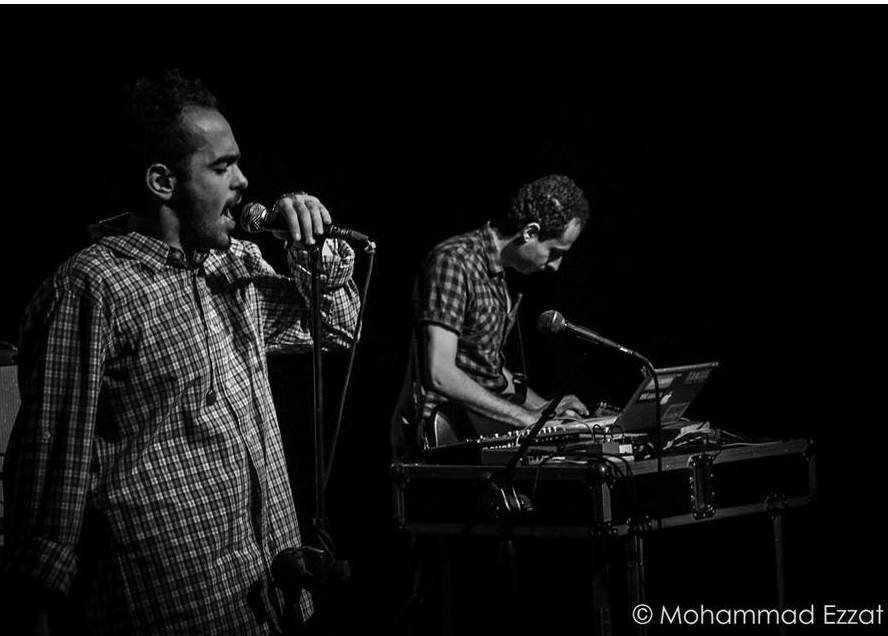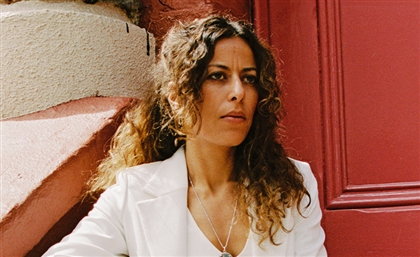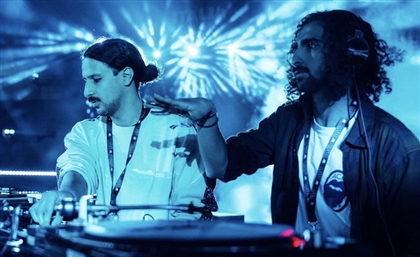Saleh & Miniawy: Whirling Beats
Spearheading the rise of a new kind of fusion sound, meshing the jagged world of Electro with the soothing sounds of Sufisim, we speak to Abdullah Miniawy and Ahmed Saleh about carving out a new, otherworldly genre...

Abdullah Miniawy is a 20-year old rapper, singer and spoken word poet from Fayoum whose voice looms large and ethereal over any listener, squelching and belting out every iota of emotion that runs through his Sufi prose. Ahmed Saleh is a sound artist hailing from Alexandria who came into prominence with his Post-Rock band Telepoetic, equally ingenious in front of a laptop as he is with electric guitar in hand. Rumi once said that “Philosophers have said that we love music because it resembles the sphere-sounds of union.” In Saleh and Miniawy’s self-titled new project they have created an extraordinary union between the contemporary left field beats of Saleh and the archaic chanting and controversial lyrics of Miniawy. Technically, it shouldn’t work, but it does. Its solemn and edgy and meaningful and it’s a sound that has garnered attention of late with the likes of Ali Talibab and Manzouma exercising something similar. Following a few stellar live performances around Egypt this year, we talk to the duo about their beginnings and the rise of Electro Sufi…
First, a bit about both your musical backgrounds? Is music your full time occupation, what else do you guys do?
Saleh: I had my first musical instrument at an early age, it was a three octave keyboard, and I was really interested in its primitive 100 sounds tone bank. This was the beginning. I joined a lot of bands and projects including Telepoetic, as well as composing the soundtracks for a lot of films and contemporary dance shows.
My background as a visual artist forced me to deal with music from another perspective and sometimes I find myself really interested in the sound materials even more than the music itself. Music is my full time occupation.
Miniawy: I was born in the KSA as an Egyptian outsider in an “expatriate" home studying between some walls, friends and a few family members. I was fond of writing and started writing at the age of eight then found myself in rap and produced two albums by the age of 12. We tend to be neutral and rebellious, through every narrow situation we come out from darkness and into light. I try to be honest as much as I can and this might be the thing that pushed me to this type of music, specifically through monologues from the crowd. Everyone participates in spoken word.
Opposing an issue among the crowd and yourself is more clear than other types of music which is presented through written down lines that might be either classic or modern with a silly attitude. "Le kol tabak mel3aka wa lekol kadma ta3m,” is a poetic line that I really like. It means “there is a spoon for every plate and a taste for every bite." I study law and we also are active on the street trying to transform lyric lines into reality.
How did you guys get together?
Saleh: In May 2013, the guys from Eka3 called me, telling me about Abdullah Miniawy and that they wanted us to make a collaboration with him and Telepoetic. They sent me some audio tracks by Miniawy and it was my first time to listen to his work. I was amazed when I listened to Tatawor Al Tsawor; his voice, the lyrics and the wide ambient sound design was really inspiring.
After a couple of months, we met in Alexandria to work on a one hour set. Three concerts were already booked and we had just six days to produce and perform the set. We discovered that Amir (our drummer) was going to be in Greece and he won’t play the concerts, also Desouky (the bassist) had disappeared, so I decided to work on the rhythm section myself.
We performed the first concert just Miniawy and I, and we really enjoyed it, the feedback was great so we played the two other concerts in Cairo and then we found ourselves playing more and more, without planning for anything.
Did you know that this was the musical direction you wanted to go in with the project or was it a case of feeling each other out and finding this sound?
Saleh: I didn't have any musical plans before we started to work, and Abdullah didn't have any either. We were just floating and the tracks came out. The process was really simple, natural and spontaneous.
How have you both influenced each other through this process, musically and as people...
Miniawy: Of course even if it's a small percentage he’s been an influence. Ahmed Saleh is a unique individual that has a mature way of dealing with electronic music. I have listened to a lot of electronic music and played it myself through several programmes, but Ahmed is a truly a remarkable individual when it comes to that type of music. We pull each other up as what we do on stage isn't different from neither what we do on streets nor how we deal with each other. Even the way we act on stage,; we try to bond it with the atmosphere of the live performance
What's your live set up?
Saleh: I play Electric guitar and electronics, Abdullah sings and sometimes he plays trumpet.
Spoken word poetry, emotive Arabic chanting back-dropped by idiosyncratic beats. It's an original sound that's very Egyptian in nature and has been popping up quite often recently with a few different outfits. Do you think this is a sound that would solidify into an identifiable and burgeoning genre in the coming year or so?
Miniawy: Of course everything branches out, especially in music. I'm pretty sure someone out there has the potential of creating and producing a new music genre even if it's without music. Aly Talbab and I feel great honour in the music genre we produce and I'm looking forward to developing it in Egypt and we think it will go viral, as it's already started.
Minawy, you seem like you're in a bit of a trance whilst performing. Can you describe what's going through your head during a live show?
Miniawy: Nothing at all as all my lines come from real life situations and we try to relive on stage. We are also trying to feed the theatrical parts through spoken word art, as the lyrics tell the story of either a social, political, or philosophic situation that we’ve experienced before. We are not supposed to close our eyes on what's happening and try to forget it.
How important is it for you to bring Sufism and conscientious lyrics forward through a modern medium to audiences here in relationship to Egypt's current zeitgeist?
Miniawy:Sufism is a beautiful way of meditating and fining one's self. Yes, we play Sufi but it's either political, social or philosophic to tell a certain story. In fact, power is in the words and Sufism is so flexible in terms of word meaning, it depends on the listener.
What kind of music do you guys listen to regularly when not performing or producing?
Saleh: Actually, I listen to all kinds of music
Miniawy: Native Egyptian music, Rap from time to time, old moshahat, Zafer Youssef, and spiritual music in general. We listen to all music genres as each has its own taste but there is only one that inspires me and makes me descend from sky to inspire Earth.
Which artists do you admire in Egypt's music scene?
Miniawy: Aly Talbab, of course, Go! Save the Hostages, Telepoetic, Joe Seif, Meriam Saleh, Mahmoud Refaat, Yasmine al Barmawy and much more…
Do you have any performances or releases we should look out for soon?
Saleh: We are working on our first album but it’s not ready yet.
Check Ahmed Saleh and Abdullah Miniawy out on their Fanpage here.
- Previous Article The Final El Fusion
- Next Article Best Egyptian Mix CDs
























